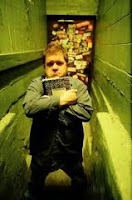
I'm a Starbucks junkie. My need for a regular latte fix reminds me of the way my mom needed her Marlboros -- as a pick me up, a stress releaser, a way to channel nervous energy by giving hands something to hold, and a way to indulge. (And now, even though I've gone decaf, I continue to glory in Starbucks' warm, milky creations.) In the way that our patterns and addictive habits help us deal with life's vicissitudes, one might make the argument that, in small ways, Starbucks saves my life every day. So I was eager to read Michael Gill's account of how Starbucks saved his life! Alas, this memoir was so bad it was almost offensive. "How Starbucks Saved My Life" is really nothing but an empty, vapid telling of Gill's story. Gill, a 60-plus-year-old victim of downsizing, could have written a book about his late-in-life stint as barista, and the insights this dramatic change in employment brought him. Instead he wrote a paean to the corporate giant that is Starbucks. Gill's account of his new life in retail lacks verisimilitude. Certainly, dealing with the public can be rewarding, but there's no denying that large slices of the multitudes are cranky and difficult. Gill's experience on the retail front lines is nothing like my memories of working with the public, where my demanding customers occasionally left me in tears! In "How Starbucks Saved My Life" all the customers are understanding, helpful and supportive, Gill's boss is the ideal mentor and his coworkers, with one minor exception, are all openhearted, top performers, without personal agendas and attitudes. Message to Howard Schultz: is Gill's book one of your marketing ploys?

Yoga and the mind-body connection fascinate me, are topics ripe for exploration. "Poser" was recently reviewed by Dani Shapiro for the New York Times, and it caught my eye. I love Shapiro. She writes earth shaking, heart-and-soul memoir and it was because she wrote up Dederer's book that I was eager to read "Poser." I wanted to see what Dederer learned about herself through the practice of yoga. The title led me to believe "Poser" would consist of separate accounts, each one focused on a single yoga pose -- like pigeon, downward facing dog, or tree pose -- and then take us to the insights Dederer found by practicing this pose. This was the book I wanted to read, but it's not the book Dederer wrote. The book I wanted to read would have given Dederer's account of how she suffered from perfectionism and the need to fit into the mothering culture in Seattle, (where co-sleeping, organic. locally-grown food, cloth diapers, breast-feeding for a minimum of a full year and coop nursery schools are
de rigueur), and how her practice of certain yoga poses eased this anguish. Although Dederer writes about specific yoga poses, she doesn't necessarily link them in an easy to follow,
I've done a pose,"point A" and this brought me to a different place in my life, "point B," fashion. Instead, "Poser" is a jumbled assemblage -- part memoir and part lesson on the history of yoga. For my taste, the memoirish part rambled, often not digging deep enough to touch me. And as for the history lessons, well, I just didn't care.
Til the next book,
 I've always wanted to read McCarthy's "The Road," but never felt emotionally ready to immerse myself in "bleak." On a recent stroll through Carmel's library, though, I spotted another McCarthy title: The Sunset Limited. And this one on audiotape!
I've always wanted to read McCarthy's "The Road," but never felt emotionally ready to immerse myself in "bleak." On a recent stroll through Carmel's library, though, I spotted another McCarthy title: The Sunset Limited. And this one on audiotape!



